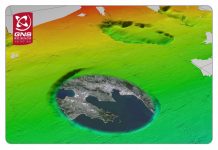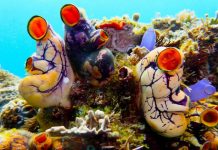After a wave of attacks that has again seen West Australia named as one of the two global hot spots for shark attacks, debate is growing in this sea-loving region on how best to deal with a predator that some say has acquired a taste for a new food source.
A University of Florida report released this week has highlighted the dilemma facing W.A. authorities with another year of fatal attacks among the 80 “unprovoked” shark attacks worldwide in 2012.
Great white sharks have been a protected species in Western Australia for more than a decade, after the International Union for Conservation of Nature identified them as vulnerable. Now it seems the shoe is on the other foot.
Australia had what was described as an “average year” with 14 attacks and two fatalities, “despite the media attention regarding incidents in Western Australia that resulted in a government- sanctioned culling hunt for endangered white sharks”, the report says.
According to George Burgess, director of the university’s International Shark Attack File, Western Australia’s five attacks in 2012 indicated a “problematic situation” where people were becoming the problem and paying the price.
“A perfect example of that is in Western Australia, where people have been getting hit in areas of known white shark abundance at times of the year when white shark numbers are at their highest – the responsibility is upon us, as humans, to avoid such situations or else pay the consequence.”
The W.A. fisheries department has responded by partnering with Surf Life Saving WA to develop new strategies for beach goers and users of the aquatic environment on the risks associated with sharks.
To lead this effort a Shark Response Unit was established in early 2012. The new unit will undertake additional research into sharks and oversee the development of a community engagement strategy to improve public safety and raise awareness of shark response and alert procedures.
Of the 370 plus shark species in the world, more than 100 live in Western Australian waters. These range in size from the tiny pygmy shark, which grows up to 30 centimeters long, to the whale shark the world’s biggest fish that grows up to 12 meters. But it is the Great While that is attacking swimmers.
Helicopter shark patrols in the South-West will be extended during the March long weekend and the Easter break.
The extended aerial patrols are part of the State Government’s 20 million U.S. dollars shark mitigation strategy.
Surf Life Saving WA’s rescue helicopter crews have been kept busy in the metropolitan area and South-West so far this summer with 246 sharks sighted by the rescue services.
Despite sharks rarely causing harm when interacting with humans, fears of a change in the predatorial habits of the Great White has riven West Australian surfers and swimmers with growing anxiety.
The most recent death in 2012 just north of the capital city of Perth, was the fifth death in just 10 months.
A 24-year-old surfer from Perth, Benjamin Linden, was attacked by a great white shark about 600 feet off Wedge Island. A jet skier noticed a pool of blood and towed the body — which the shark had severed in half — to the shore.
The presence of some shark species as “apex predators” occupying the very top level of the food web is actually an indication of a healthy marine environment. Sharks worldwide have become threatened by the extensive trade in Shark Fin soup and activists have reacted strongly against government moves to cull the Great Whites.
As well as their environmental importance, sharks are a valuable resource for the fishing and tourism industries.
Last year the Western Australian Premier Collin Barnett and Fisheries Minister Norman Moore, announced an allocation of 6.85 million Australian dollars for a shark cull as part of its “shark mitigation” strategy, in response to the wave of sharks attacks in the state.
Two million Australian dollars of these funds was to be allocated to a new service to allow the Department of Fisheries to track, catch and, if necessary, destroy sharks (species not specified) in close proximity to beach goers including setting drum lines if a danger is posed.
This is in contravention of a report, itself commissioned by the WA Department of Fisheries – “Due to the environmental impacts of shark control activities, it is not recommended that either shark nets or drum-lines be introduced into Western Australia.”
In a poll conducted by The West Australian newspaper, 82 percent of respondents said “No” when asked the question “Should Great White Sharks Be Culled?”
According to Shark Alarm, a group that monitors shark activity in Australian waters, the state government’s decision may actually cause more damage than good.
“People who love the ocean, and who respect that this species is endangered will now most likely refuse to report the sighting at all, in fear that the shark will be killed by the government,” a spokesman said.
All seems to be cold comfort for tourists who are now thinking hard about how best to cool down during another sizzling Perth summer.
As temperatures topped 42 degrees for the fourth consecutive day, visitors Alana and Michel from Clermont-Ferrand in France told Xinhua they would not be going to the beach – there were other ways of getting through the heat.
“Actually, we would rather just drink beer it is very good, and much safer.”



















